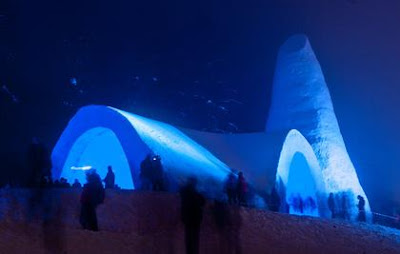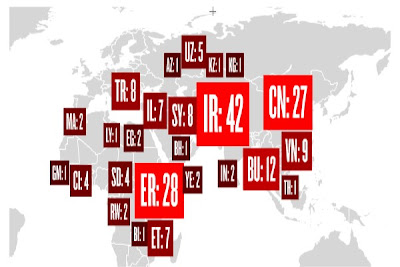
Nigeria's most talked-about hip-hop video exhibits all the excesses of its American counterparts - beautiful, scantily clad models, a mansion and a bathtub full of hundred-dollar bills.
But the biggest surprise? America's own Snoop Dogg playing back up to Nigerian star D'banj, embracing him as his nephew and taking a Nigerian passport before leaving the rest of the remixed "Mr. Endowed" to the Yoruba-singing heartthrob.
Nigeria, Africa's most populous nation with 150 million people, long has been a leading cultural influence across the continent. Its low-budget "Nollywood" films can be found everywhere, while its music plays in taxicabs and minibuses far beyond its borders.
Now, however, Nigerian artists who once mainly imitated U.S. hip-hop proudly include African beats and their local languages on their own energetic songs. That combination appeals to both Nigerians, who are now proud of so-called "Naija" music, and to a growing foreign following as well.

"The beauty of music is that you don't need to understand it," female rapper Mo'Cheddah recently told The Associated Press. "Our music is traveling."
Like American hip-hop and pop music, Nigerian hip-hop uses samples, and also borrows from dancehall, house, and even zouk beats. The languages used are mainly Nigerian, with a predominance of Nigerian Pidgin English, as vocalists either sing, rap, or blend a combination of the two. It's is mostly upbeat, feel-good music, and the message usually optimistic. It's hugely popular, represents the youth culture and has become part of the mainstream Nigerian sound.
Satellite television networks like MTV Base, Channel O and Trace that transverse the continent cemented the reputation of Nigerian urban music in Africa. Songs by Nigerian artists like 2Face, P-Square and MI feature prominently at nightclubs in neighboring Ghana and as far away as Uganda and South Africa.
With a growing Nigerian population in the United States, Europe and Asia, the appetite for the tunes has only been growing.
"When I started out in the '90s, I struggled to play Nigerian music, but now I find it difficult to play anything else," Nigerian DJ Jimmy Jatt told the AP after recently returning from a trip to Malaysia.
"People are feeling our sound everywhere," he said. "I try not to be selfish but the moment I move away from our stuff, the party slows down. Music from other countries is also good, but it's just that ours is high energy."
While irresistibly danceable beats and the use of local languages and slang have become defining traits of Nigeria's urban sound, it also carries with it a nationalistic pride sometimes missing in the diverse nation. Home to more than 150 ethnic groups and even more local languages, Nigerians of different origins are still learning to live together 50 years after the West African country gained independence from Britain and some 40 years after the end of a bloody civil war.
Nigeria's best-known artists offer a united identity for a fractured nation. Rappers like Naeto C from the country's Christian southeast borrow words from the Hausa language of the Muslim north and the Yoruba language in the southwest.
"We're representing our country to the fullest," said Mo'Cheddah, the recent winner of the MTV Africa Music Awards' Best Brand New Act award. "We're putting our country on the map on a positive note. It's not just about the bad things, fraud."
It's also catching an international reputation as Nigerians put more of their music online. A French music executive late last year approached Audu Maikori, CEO of the Nigerian record label Chocolate City, to license a song.
"At first I thought, what would a French guy want this? But, that's what social media does," Maikori said. "People can now share. ... The traditional revenue streams have died but there's a whole new audience for your music."
Those new ways to earn money remain incredibly important in Nigeria, a nation awash in pirated movies and music. Pirated CDs remain much easier to come by than original ones hawked in Lagos traffic or hanging in market stalls. Now, artists no longer expect to make profit from albums. At an average price of $1, the records are only meant to promote their act.
Nigeria has had a long musical tradition with artists such as IK Dairo honored by the Queen of England as early as 1963. Afrobeat pioneer Fela Anikulapo-Kuti fought against the injustices of military rule in Nigeria and inspired a Tony Award-winning Broadway show long after his death.
But Nigerian hip-hop is more social than it is political, often addressing the challenges of everyday life while delivering a dose of optimism that Nigerians can overcome them. There's also a strong element of nationalism, as videos make generous use of the Nigerian flag and its green-and-white color scheme.
Now, the new generation too is paving the way with its own musical traditions.
"When you see this, Africa, you know, believe in yourself," D'banj said in a video clip showing him sitting next to Snoop Dogg. "Believe in the future."Hop has "the Hef" and "the Hoff" -- which means this kids' movie about the Easter Bunny's vocational crisis feels slightly different from most average kids' fare.
Tim Hill's feature pushes buttons. It veers into vulgarity, talks about bodily functions, and even goes so far as to tackle issues of faith and non-Western cultural values.
What makes it all that much stranger is that it's about the Easter Bunny, one of the more popular holiday icons, yet a character denied his cinematic close-up outside of the odd cameo or side role in a pageant.
We've had plenty of stories about Santa, the chief mascot and brand logo behind Christmas. The volume of Noel narratives has trained us to put all the religious meaning of these occasions into the background, and simply focus on cuteness and consumer hedonism.
Hop does exactly the same thing: It's a completely secular treatment that ignores -- somewhat wisely -- the death of Jesus on the cross and his eventual ascension.
Slow death at the hands of Roman soldiers remains a tough sell for the toddlers, but martyrdom still lurks beneath the tinted eggs and cuddly, pixelated creatures scampering around on screen.
E.B. (Russell Brand) is a teenage rabbit who has led a life of absolute privilege in an upscale warren. As the son of the reigning Easter Bunny, E.B. never really had to think about what he wanted to do with his life: Everything was already planned.
Yet, when it comes time to take over from his aging father (Hugh Laurie) and deliver parcels of brightly packaged candy to the children of the western world, E.B. experiences a crisis.
He feels unprepared and unwilling to meet his destiny. E.B. would rather be a drummer in a rock 'n' roll band, and in order to make his dreams come true, he decides to run away to Hollywood.
The moment he arrives in the Hills, he meets Fred O'Hare (James Marsden), a young man very much like himself. Fred just got kicked out of his parents' house for being a grown-up slacker.
Without a job, prospects or motivation, Fred is an interesting representative of the human species. Like E.B., he's used to living the easy life, but when the two meet at the end of a skid mark, everything changes.
The rabbit and the man teach each other important life lessons about growing up, being a good friend and following the path of personal truth. They also make sure we get a few adult-oriented yuks via Hugh Hefner's "bunny" mansion and David Hasselhoff's entire career.
The standard elements of storyline work, but only at the baseline. This movie scores its biggest points when it embraces the absurdity of its own premise.
For instance, at one point, Fred tells his furry friend not to speak out loud among other people. After all, a talking rabbit could make people "freak out."
Yet, when the bunny does get verbose, no one bats an eyelash, because this is Los Angeles.
Skewering the fame urge, reality television and the very concept of "beloved holiday icon," Hop definitely had big teeth to work with, and a rather edgy tone, but it never feels sharp.
Marsden proves he's got pretty good comic timing and a fierce ability to act with green-screen elements, but his character isn't easy to love -- nor, for that matter, is E.B.
In fact, both of them feel like spoiled little brats that deserve a thick slice of just desserts, and that's probably the biggest clump in the batter: They're just a little empty.
Maybe the underlying vacuous quality of all the screen characters -- even mom and dad -- was a truly subversive comment on our increasingly fundamentalist world, but probably not.
Hop is a just another huge dose of digitally coded eye candy designed to get your youngster revved up for the confectioner's holiday jackpot -- and all its secular powers of consumer suggestion...













